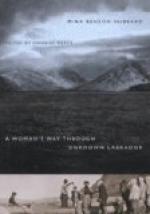Years afterwards, when on a canoe trip on the Moose River, a disconsolate looking little Indian dog came and sat shyly watching us while we broke camp. We learned that the Indian owners had gone to the bush leaving him to fare as he might through the coming winter. When our canoe pushed out into the river there was an extra passenger. We brought him home to Congers, where he immediately carried consternation into the neighbouring chicken yards, convinced that he had found the finest partridge country on earth.
When sixteen the boy went to attend the Angola (Indiana) Normal School. Here his decision for Christ was made. He was baptized and united with the Church of Christ. Three years later his teaching took him to Northern Michigan where be found a wider range than he had yet known, and in the great pine forests of that country he did his first real exploring. Here were clear, cold streams with their trout and grayling, and here, when his work admitted, he hunted and fished and dreamed out his plans, his thoughts turning ever more insistently to the big, outside world where his heroes did their work.
He entered the University of Michigan, Ann Arbor, in 1893. High strung and sensitive, with a driving energy and ambition to have part in the larger work of the world, be suffered during the early part of his course all the agonies that come to those of such a nature while they grope in the dark for that which they are fitted to do. He reached out in many directions in his effort to provide the needful money to enable him to take his course, but without a sense of special fitness in any. It came however with his earliest attempts in journalistic work. The discovery with its measure of self-recognition brought a thrill that compensated for all the dark hours. He now felt assured of success.
His life in the University was one of varied and unceasing activity. In his studies history, literature, psychology claimed his special interest. He was an enthusiast in athletics, and found his field in running and boxing. The contest was as the wine of life to him. He was active in the literary and debating societies, and prominent in the Student’s Christian Association, attending and taking part in the work of the local branch of the Church of Christ. His first newspaper work was done as an amateur on the college press. Then came assignments from the local dailies and correspondence for the Detroit papers.
He possessed the “news sense” to an unusual degree, delighting to take “beats” from under the very feet of his brother reporters.
In 1897 while he was still in Ann Arbor, just before Dr. James B. Angell, President of the University, left on his mission to Turkey, a telegram came from a Detroit evening paper directing him to see Dr. Angell and ask why he had changed his date of sailing.
Dr. Angell was not in the habit of telling reporters what he did not wish them to know, and when asked the question replied: “Haven’t a word to say. I really don’t know anything new at all.” Then with a smile which he fondly believed to be inscrutable, he remarked: “Why, I don’t even know whether I’ll go to Turkey or not.”




